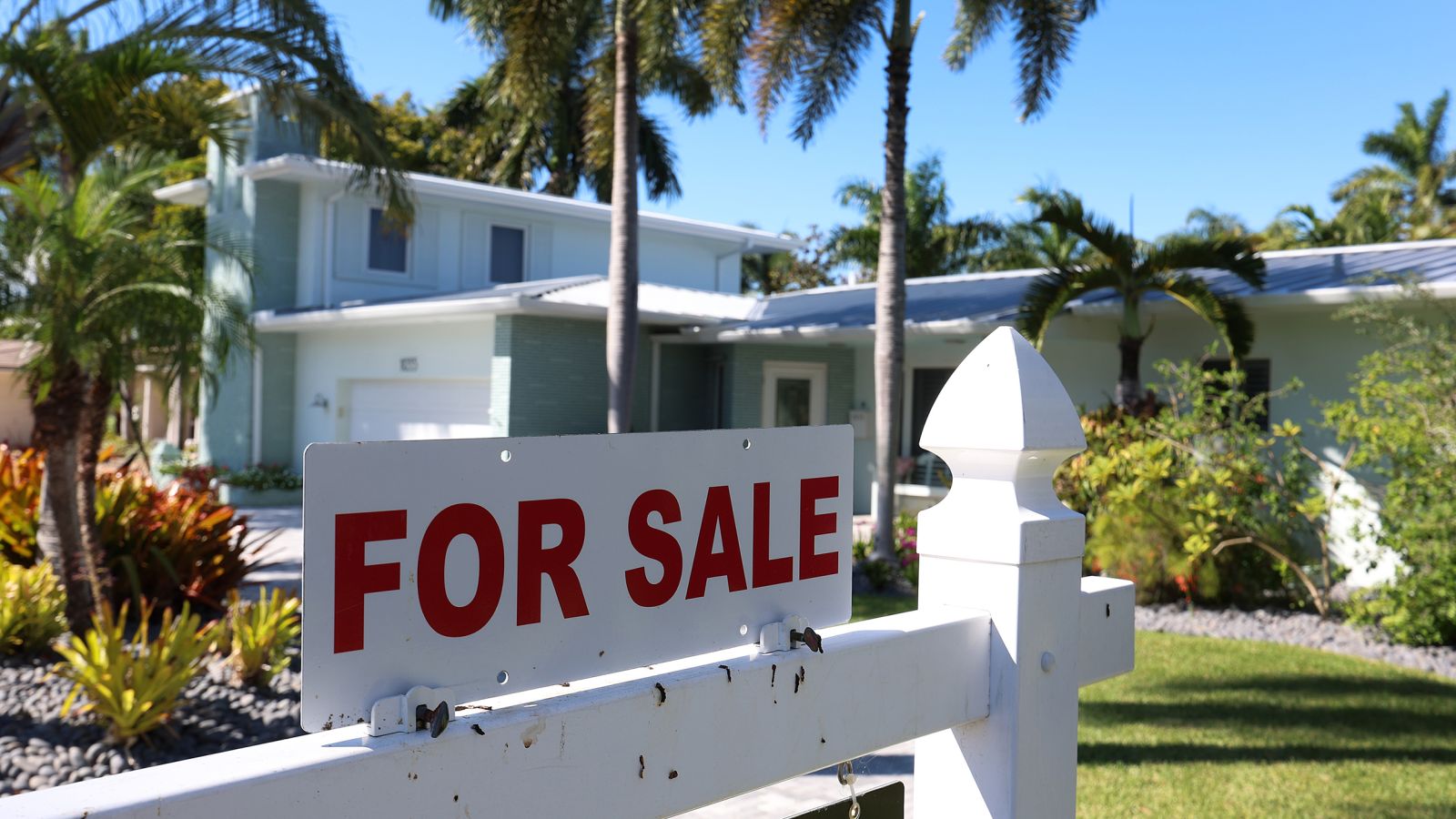US: Will Home Prices Collapse?
8:13
(CNN) --
Make no mistake: This is a lousy time to buy a home.
Mortgage rates for a 30-year fixed-rate loan hover around 7%, more than 4 percentage points higher than they were a year ago.
That has reduced the purchasing power of a typical buyer by 14%, according to Black Knight, a mortgage data company.
That means there are currently fewer people able or interested in buying, so home sales have plummeted.
Only 16% of people think this is a good time to buy a home, which represents an all-time low, according to a monthly survey conducted by Fannie Mae in October.
Inflation cools down more than expected in the US: consumer prices increased 7.7% in October
Still, that has barely made a dent in home prices, which soared to new highs during the pandemic and are only now coming down from those all-time highs.
Another thing holding back sales is the stubbornly low inventory of homes available for sale, said Jackie Lafferty, a real estate agent with Baird & Warner Real Estate in Chicago.
advertising
"It's a combination that I've never seen before, lack of supply and very high interest rates," Lafferty said.
“There is no motivation for people to move, unless they have to.”
US: Will Home Prices Collapse?
8:13
Whether people need to move because of a new job, a divorce, a new family member, or just don't want to give up after years of trying to buy a home, the truth is that there are still buyers out there. .
"Even if sales go down, real estate business doesn't stop," Lafferty said.
"People need a place to live."
For those who insist, here are some tips to make buying a home a little easier.
Apply for a loan now and refinance later
Buyers who apply for a mortgage now do so with the hope that in a couple of years rates will drop significantly and they will be able to refinance at a lower rate.
“Yes, rates have gone up much higher and faster than anyone expected,” said Melissa Cohn, regional vice president at William Raveis Mortgage.
“But if someone can afford to buy today and wants and needs to, they shouldn't let the high-rate environment stop them, especially since sometime next year, or two years at the latest, rates are likely to be higher. significantly lower."
The downside:
High rates will have to be put up with for the time being.
There is some risk that interest rates will not go down, or at least not much.
And if mortgage rates don't go down, you could be stuck for a while, said Delyse Berry, CEO and principal broker at Upstate Down in Rhinebeck, New York.
"There could be a decrease in rates in mid-2023," he said.
“If that happens, you can refinance and get a lower interest rate and lower payments.
But those fees are now the new cost of doing business.”
Also, refinancing can be extremely expensive.
Closing costs typically range from 2% to 5% of the initial loan amount.
Likewise, unexpected events such as losing your job or your home losing value can prevent you from refinancing.
Get an adjustable rate loan
Increasingly, homebuyers are exploring options outside of the standard 30-year fixed-rate mortgage.
For example, adjustable-rate mortgages, or ARMs, now make up 12% of mortgage applications, up from 3% a year ago, according to the Mortgage Bankers Association.
The average rate for a 30-year fixed-rate loan was 7.08% last week, while the 5-year Treasury-indexed hybrid mortgage adjustable rate was a percentage point lower at 6.06%, according to Freddie Mac. Although they are also 30-year loans, ARMs offer a fixed rate for a set period, usually 5, 7 or 10 years, after which the interest rate resets to market levels.
“Buying today is about figuring out what to do to avoid high rates and feel comfortable with your purchase,” Cohn said.
“When rates go down, it will be time to see what the most permanent solution is.”
For buyers who will be moving houses in 5-7 years anyway, an ARM can be a way to increase purchasing power.
“For the first 5 or 7 years of an adjustable-rate mortgage, it walks, talks and acts like a fixed-rate mortgage,” Cohn said.
"It has a lower rate and a lower payment because the bank only guarantees it for a shorter period of time."
If rates go down, an ARM could even reset to a better rate.
The downside:
Borrowers must also accept the risk that rates will be even higher when the loan is reinstated, or at any point during the life of the loan.
After the fixed period, ARMs can be reset every year or every six months.
However, most have limits on how much a rate can go up or down during each reset period and for the life of the loan, so it's important to understand how each works.
Reduce your interest rate with points
Borrowers can reduce their installments by paying in advance.
This will lower the interest rate on the loan, either permanently or temporarily.
While a permanent reduction changes your rate for the life of a loan, a temporary reduction provides lower rates over a period of time.
In a term buyout, borrowers typically get two percentage points off the loan rate in the first year, one percentage point off the second year, and by the third year, the loan goes back to its original rate for the remainder of your term.
By then, many borrowers are hoping for lower interest rates, leaving the possibility of refinancing open.
"It's a significant difference for the first year of the loan because it brings the rate down from 7% to 5%," Cohn said.
The downside:
While getting a lower interest rate is very attractive, it means shelling out more money up front.
That might not make financial sense if you don't plan on staying in the house for long.
“It takes about five years to break even when paying a point,” Cohn said.
"Knowing that rates are likely to be significantly lower by then, it's better to take the money you'd use to pay the points to pay for refinancing later."
Apply for seller credit to lower your rate
In some real estate markets, competition between buyers has eased and sellers are forced to be more flexible in their offers.
One way a buyer can lower their payments is to apply for a seller's credit, or seller's concession, as part of the deal.
Buyers can use that money to lower their mortgage interest rate and lower their monthly payments.
“Sellers are more willing to negotiate now than they have been in the past,” said Trudy Kelly, senior home loan specialist at Churchill Mortgage in Oregon.
In September, when mortgage rates hovered around 5.75%, Kelly worked with borrowers buying a $590,000 home.
Instead of offering $15,000 or $20,000 below the asking price to lower the cost of monthly payments, the buyers asked for a $15,000 concession from the seller.
If buyers had made a lower offer and got the house for $575,000, their monthly savings would be $78, Kelly said.
But by lowering the interest rate by one percentage point, her payments were reduced by $340 a month.
"That's a big difference," he said.
“Ultimately what that did for them was expand their budget.
It lowered their debt-to-income ratio by giving them more buying power.
It puts them in a time machine and takes them back to April or May [when rates were lower].”
The downside:
In many areas, it's still a seller's market.
Applying for credit or a concession may be less attractive to a seller if he has other offers.
Buy cash or increase your down payment
If you have the money to buy a house, now is a good time to do it.
Not only will you avoid paying a high rate on a mortgage, but you'll likely be able to negotiate a better price.
But not many people can pay cash: 97% of homebuyers in the last year needed financing for their home, according to a recent report from the National Association of Realtors.
Even if you don't have enough cash to close a deal, putting more down will lower your mortgage amount, lower your monthly payments, and mean paying less interest over the life of the loan.
If you own your current home, you can tap into some of the cash from the sale or possibly even tap into equity to increase your down payment.
By making a larger down payment, you will not only reduce your loan balance, but also increase the equity in your home, money that you can get back when you sell, assuming the property appreciates.
The downside:
Using cash for a property purchase is always a trade-off, as you will have to forego other possible investments.
And for most shoppers, spending more money isn't an option.
The typical down payment for first-time buyers is 6%, while for repeat buyers it's 17%, according to the National Association of Realtors.
HomesinvestmentReal estate marketproperties






